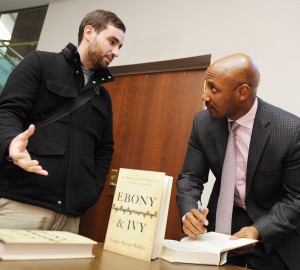PhD student Salvatore Cipriano reports on Craig Wilder’s talk at History Day 2014.
On February 20, Fordham alum and current professor of history at MIT Craig Steven Wilder delivered the keynote address for our Third Annual History Day. Dr. Wilder’s lecture, entitled “How Slavery Shaped Schools: Northern Opposition to Black Education in Pre-Civil War America” drew on many of the main ideas of his critically-acclaimed Ebony and Ivy: Race, Slavery, and the Troubled History of America’s Universities published by Bloomsbury Press last year.
In front of a standing-room only crowd in the Flom Auditorium, Dr. Wilder offered a fascinating look into the seldom-heard relationship between slavery, racism, and America’s oldest universities. Dr. Wilder problematized the largely accepted view of a staunchly abolitionist American north, which was home to the majority of American colleges in the pre-Civil War era. The universities, such as Yale, Harvard, King’s College (Columbia), and the College of Rhode Island (Brown), were active participants in the American slave enterprise, providing an education for young white men, many of whom made careers as southern planters after completing their undergraduate studies. Dr. Wilder also noted that American university men were much more likely to promote the re-colonization of slaves in Africa rather than abolition in illuminating the close relationship between these schools and the nineteenth-century American Colonization Society. The lecture also highlighted virulent opposition to black education, whether at the primary or collegiate level, in northern states, challenging our conceptions of the north as a place of increased racial acceptance in opposition to the pro-slavery south. In concluding, Dr. Wilder offered some reflections on how universities today needed to recognize their part in the story of American slavery, noting that some institutions, including Brown University, have already begun projects that examine and reconcile the histories of the universities with slavery.


